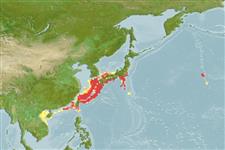>
Aulopiformes (Grinners) >
Aulopidae (Aulopus)
Etymology: Leptaulopus: Name from Greek 'leptos' meaning slender and 'aulopus' for a name long applied to the broader group of fi�shes to which the genusbelong; referring to the slender form of the speciesit comprises..
More on author: Tanaka.
Environment: milieu / climate zone / depth range / distribution range
Ekologi
laut dasar (demersal); kisaran kedalaman 100 - 500 m (Ref. 51600). Subtropical
Western Pacific: Japan, East China Sea, Taiwan and Australia.
Size / Weight / umur
Maturity: Lm ? range ? - ? cm
Max length : 31.1 cm SL jantan/; (Ref. 94775)
Duri punggung (Keseluruhan (total)): 0; duri punggung lunak (Keseluruhan (total)): 14; Duri dubur 0; Sirip dubur lunak: 8 - 9. Distinguished from other Aulopus species of Japan in having fewer dorsal fin rays, and its orbit that is less than snout length. Second dorsal ray in males not prolonged; pyloric caeca 9-13 (Ref. 31559).
Life cycle and mating behavior
Kematangan | Reproduksi, perkembang biakan | Pemijahan | telur-telur | Fecundity | Larva
Gomon, M.F., C.D. Struthers and A.L. Stewart, 2013. A new genus and two new species of the family Aulopidae (Aulopiformes), commonly referred to as Aulopus Flagfins, Sergeant Bakers or Threadsails, in Australasian waters. Spec. Div. 18:141-161. (Ref. 94775)
Status IUCN Red List (Ref. 130435)
ancaman kepada manusia
Harmless
penggunaan manusia
informasi lanjut
Nama-nama umumSinonim (persamaan)metabolismePemangsaEkotoksikologiReproduksi, perkembang biakanKematanganPemijahanSpawning aggregationFecunditytelur-telurpekembangan telor
Umur / SaizPertumbuhanpanjang-beratpanjang-panjangukuran frekuensiMorfometrikMorfologiLarvaDinamika larvapemulihanKelimpahanBRUVS
AcuanBudidaya airprofil budidaya airStrainGenetikaElectrophoresesDiturunkanPenyakit-penyakitPengolahanNutrientsMass conversion
mitraGambarStamps, Coins Misc.Suara-suaraCiguateraKecepatanTipe renangArea insangOtolithsOtakPenglihatan / visi
Alat, peralatan
laporan khas
muat turun XML
Sumber internet
Estimates based on models
Preferred temperature (Ref.
123201): 4.1 - 20.2, mean 15.2 °C (based on 50 cells).
Phylogenetic diversity index (Ref.
82804): PD
50 = 0.7500 [Uniqueness, from 0.5 = low to 2.0 = high].
Bayesian length-weight: a=0.00447 (0.00187 - 0.01067), b=3.12 (2.91 - 3.33), in cm total length, based on LWR estimates for this (Sub)family-body shape (Ref.
93245).
Trophic level (Ref.
69278): 4.1 ±0.7 se; based on size and trophs of closest relatives
Fishing Vulnerability (Ref.
59153): Low to moderate vulnerability (28 of 100).
